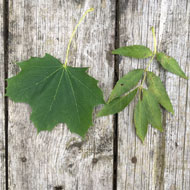‘Perfect storm’ increases risk of atypical myopathy

High winds this autumn could result in greater spread of seeds, as they have yet to fall naturally.
A ‘perfect storm’ is increasing the risk of atypical myopathy in grazing horses, experts have warned.
Horse owners are being urged to take steps to reduce the risk now, as bare pastures, potential hay shortages and early transatlantic storms make outbreaks of the disease more likely.
AM is a sudden onset muscle disease caused by the toxin hypoglycin A, which is most commonly found in the seeds of the sycamore tree in the UK, or the box elder in North America. Both trees bear the typical helicopter-shaped fruit that distribute seeds over long distances.
According to the British Equine Veterinary Association (BEVA), high winds this autumn could result in greater spread of seeds, as they have yet to fall naturally.
Equine medicine expert Adam Redpath, who is working on AM at Nottingham vet school, said: “Horses do not typically choose to eat sycamore seeds, however when pastures are bare, there is a greater tendency for them to be ingested as horses are foraging for every last blade of grass.”
The amount of toxin in sycamore seeds is affected by a range of factors, meaning the toxic dose can vary from less than 100, to several thousand single seeds. As each tree can shed over 20,000 fruit, each with two seeds, the amount on pasture can be considerable.
Clinical signs vary considerably and include dark brown urine, weakness, reluctance to move, but usually normal or increased appetite. In the most severe cases, horses develop very severe colic-like signs.
BEVA is urging horse owners to take the following steps to limit access to sycamore seeds:
- Identify trees both around grazed fields as well as those in close proximity. Trees are often easiest to identify in the summer when in full leaf, rather than in the autumn, when leaves have largely fallen. The characteristic maple leaf shape is easy to spot, although if in doubt a test is available from the Royal Veterinary College as a result of work funded by The Horse Trust.
- Collect seeds or exclude horses from affected areas using electric fencing or stabling.
- Feed supplementary hay to try and prevent horses from excessive foraging for short blades of grass and inadvertent ingestion of seeds. But ensure that hay does not become contaminated by seeds.
- Don’t rashly fell trees when laden with seeds as this can cause a sudden and massive contamination of the pasture. Consider local regulations, tree protection orders and tree ownership if felling is the only option.
- Monitor horses carefully even after they have been moved from affected pasture as disease can occur up to four days after exposure.



 RCVS Knowledge has welcomed Professor Peter Cockcroft as editor-in-chief for Veterinary Evidence.
RCVS Knowledge has welcomed Professor Peter Cockcroft as editor-in-chief for Veterinary Evidence.